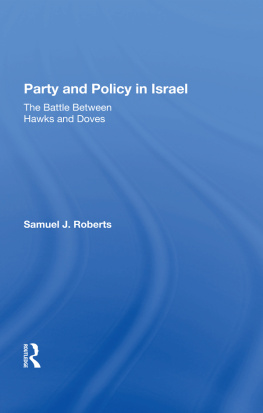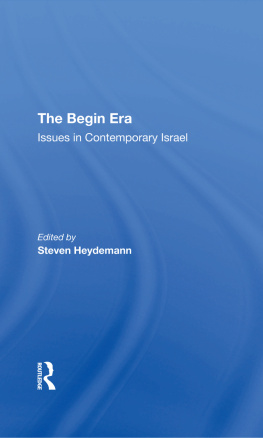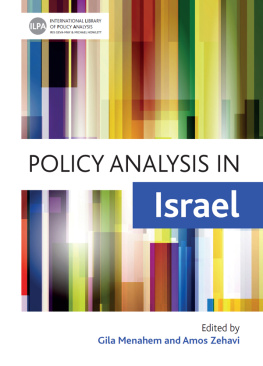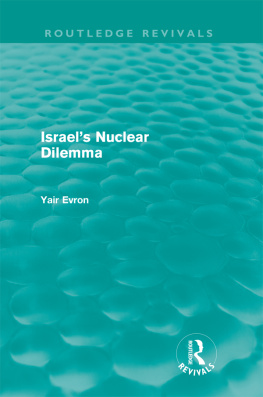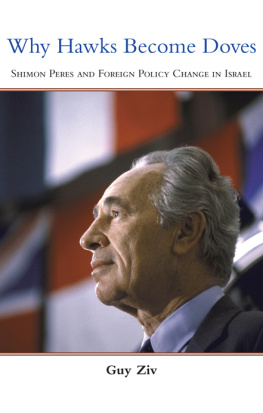In the dynamic interaction between Israeli domestic politics and Israeli foreign policy, the role of Israeli parties is of crucial importance. The political parties dominate the functioning of the Israeli government to a striking degree. The dominant role of the parties extends into foreign policy decision-making just as it does into the sphere of domestic policy. While there are obviously extra-political considerations that affect foreign policymaking, the role of personal competition and factional conflicts within the key parties and the struggle for power among them is a central factor. Before addressing these issues directly, we propose to assess the overall role of the parties in Israeli politics and in Israeli government decision-making.
Israeli parties have historically occupied a hegemonial position within the political system. They have played a central role in shaping the economic sphere, in the provision of culture and education, and in affording mechanisms for the socialization and acculturation of immigrants. The parties have served as the primary training ground for the leadership cadres of the Yishuv (the pre-state Jewish community in Palestine), and later, for the state.
The parties have heavily penetrated the state bureaucracy. They have also served as the principal vehicles for political expression, and for the cooption of talented newcomers into the establishment. Parties have played a major role as providers of employment, housing, educational facilities, medical care, and social and recreational amenities. They have served as both stimulators and legitimators of economic productivity. They have continued to act as important agents of national mobilization and organization despite the determined efforts of Ben-Gurion and his successors to implement etatization--the strengthening of the state as the principal institutional force in Israeli society.
The parties have enjoyed the status of quasi-sovereign entities in both the Yishuv and the state, historically serving as the fount of legitimacy and authority. They have been able to exercise enormous power thanks to their ability to blend legitimizing ideology, coherent world view, and the effective performance of necessary mobilizing and nation-building functions.
The parties have been able to achieve, and to a substantial extent maintain, their dominant position because of their historical, institutional, and ideological successes. In the pre-state period they filled the vacuum created by the condition and needs of Diaspora and Yishuv : the absence of a sovereign Jewish state, the existence of a multiplicity of competing political-ideological trends within the Diaspora, and the need of both Diaspora and Yishuv for effective mobilizers of dynamic action. The weaknesses of the Yishuv during both Ottoman and Mandatory times--the lack of capital, the vulnerability to hostile political pressure, the need for effective collective action which could be secured only via voluntary institutions commanding the allegiance and stimulating the productivity of the Jewish population--gave the Zionist parties their opportunity. The parties seized this opening, offering the needed ideological stimulus, elan, and institutional structures, turning themselves into the principal entrepreneurs, builders of the Yishuv , and creators and controllers of the Yishuv political apparatus.
The parties achieved hegemony in the Yishuv by accumulating assets and creating institutions through which they were able to dominate it and, in its early stages, its successor, the state. Although state institutions were established, endowed with wide authority, and substantially depoliticized after 1948, the pre-state party-affiliated institutions, assets, and practices continued to exist and function effectively. These institutions provided the parties with the necessary economic, political, and psychological leverage to retain their dominant position. Parties could draw not only upon party-affiliated institutions, economic assets, and a solid cadre of supporters, but could mobilize Diaspora resources and lobbies as well. They thrived--and continue to thrive--on this network of supporting institutions. The Histadrut , the kibbutzim , the economic enterprises, the welfare organizations, and the ideological and financial ties with groups in the Diaspora remain the substantive sources of the parties persisting power. Furthermore, the system of proportional representation in its Israeli form--with Israel treated as a single national electoral unit, with Knesset seats distributed to the parties in proportion to national electoral results, with the parties determining rank ordering on the Knesset list, with governments being based upon a coalition of parties--has facilitated the domination of cabinet membership and governmental decision-making by the highly organized parties.
This electoral system, in conjunction with the politically-mandated necessities of coalition government, coalitionary bargaining, the one-and-one-half party system, (i.e., the long period of labor/religious rule), the self-perpetuation of party oligarchies, intra-party factionalization, and consensual methods of decision-making were all established, and became deeply-rooted, in the Yishuv period.
The absence of significant institutional competitors to the parties has strengthened the latters dominance. Thus, neither the state bureaucracy nor the media have been able to wield anything like the power their counterparts exercise in other democratic societies.
The predominant position of the parties has been bolstered by the ideological, historical, and personal antagonisms which have traditionally envenomed Israeli politics. These inter-party animosities have acted as at least a partial counterweight to the secular trend toward ideological disintegration. They have consequently been a force for intra-party coherence and identity.
The structure of the electoral system and the nature of Israeli political institutions reflect the historical primacy of the parties and simultaneously reinforce this predominance in the face of countervailing pressures. Despite these structural buttresses, however, the role of the parties has declined over the years. The eroding primacy of the parties has been both a consequence of and a stimulus to certain modern trends. Prominent among these are personalism, alienation, the rise of extra-party pressure groups, the decline of ideology, the delegitimization of party authority, the de-charismatization of party and state leadership, and the growing inability of the parties to resolve, even provisionally, the staggering problems which confront the state.

